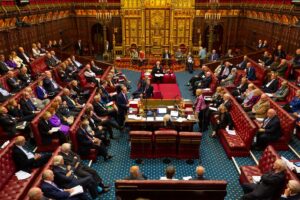Discussing the Football Governance Bill this week, CEO of West Ham United & peer, (Baroness) Karren Brady attempted to draw a distinction between Premier League clubs and others, but I think she’s very evidently wrong, and I’m going to attempt to explain why.
This is the relevant passage of her speech:
‘Clubs are not one-size-fits-all entities; each has its own unique character, fanbase and operating environment. For example, the dynamics of a global club with millions of international fans will differ significantly from those of smaller community clubs, many of whose supporters live within a few miles of the ground.’ (My emphasis)

They are indeed different, depending on their history, their fanbase, their location. This is what makes them special, on that we do agree.
However, the idea that football clubs at the top are so vastly different from those at the bottom of the pyramid is one of the reasons that we are seeing the introduction of a regulator: it is precisely because too many clubs at the top forgot that they are in fact local institutions first and global sporting behemoths second that a group thought it was ok to join a breakaway European Super League, and why Project Big Picture was considered a good idea.
It is precisely because too many clubs at the top forgot that they are in fact local institutions first and global sporting behemoths second that a group of them thought it was ok to join a breakaway European Super League, and why Project Big Picture was considered a good idea by much the same group.
This straining at the edges of what football actually is and the privileges granted to clubs to operate in the English structure is why we are now witnessing this debate, and why we will see a regulator. It is why these views are now being aired in the way they are, why they must be taken on, and why the argument must be won, and for West Ham United’s sake as much as any other.

It is not that West Ham United or Manchester City are not entitled to develop whatever marketing strategy they wish to grow their ‘global reach.’ Even at AFC Wimbledon we have a desire to grow our international reach through membership of the ownership of the Dons Trust. Ultimately, however, clubs are geographically defined local football monopolies, not an NFL franchise that can be moved about and take advantage of the best market conditions in an alternative area. They have a series of strictly enforced requirements that permit them to operate (membership of their local FA county, membership of a league in the pyramid).
Manchester United might think itself as global, but the most active and, yes, important fans (those who attend regularly and will tend to live closer to the stadium itself, or at least in the same region or country) regard it as local, because it is.
Despite pre-season friendlies and fans from abroad day-tripping to watch football, the last time I looked, no football club is the equivalent of the Harlem Globetrotters, touring around the World as a club for hire, like some kind of a wandering football troubadour.
That appears to be the tension that Karren Brady seeks to address and resolve in her intervention, but she’s incorrect in her assertion that football clubs are all that different at the top versus the bottom. There is such huge support for the regulator being able to protect the position of clubs as unique and very specific in the lives of all their communities across the board, and anything legitimate within the bill that seeks to do that must be supported. I’m not going to go into the role of FIFA or UEFA, because this is always rolled out by opponents of regulation, as if they haven’t heard of French sports law.
To try to help to resolve this tension ourselves, we’re going to be releasing some research early next year that will build on this idea that the foundations of all clubs can work to a set of shared principles and structures, specifically when it comes to fan engagement.
Keep an eye out and sign-up to the View on Fan Engagement to keep up-to-date with what we’re doing.
You can read through the debate via the Houses of Parliament’s official journal of record, Hansard, via this link: https://hansard.parliament.uk/Lords/2024-12-16/debates/8a185107-cd47-46e8-8688-7cdcbcbc9754/LordsChamber